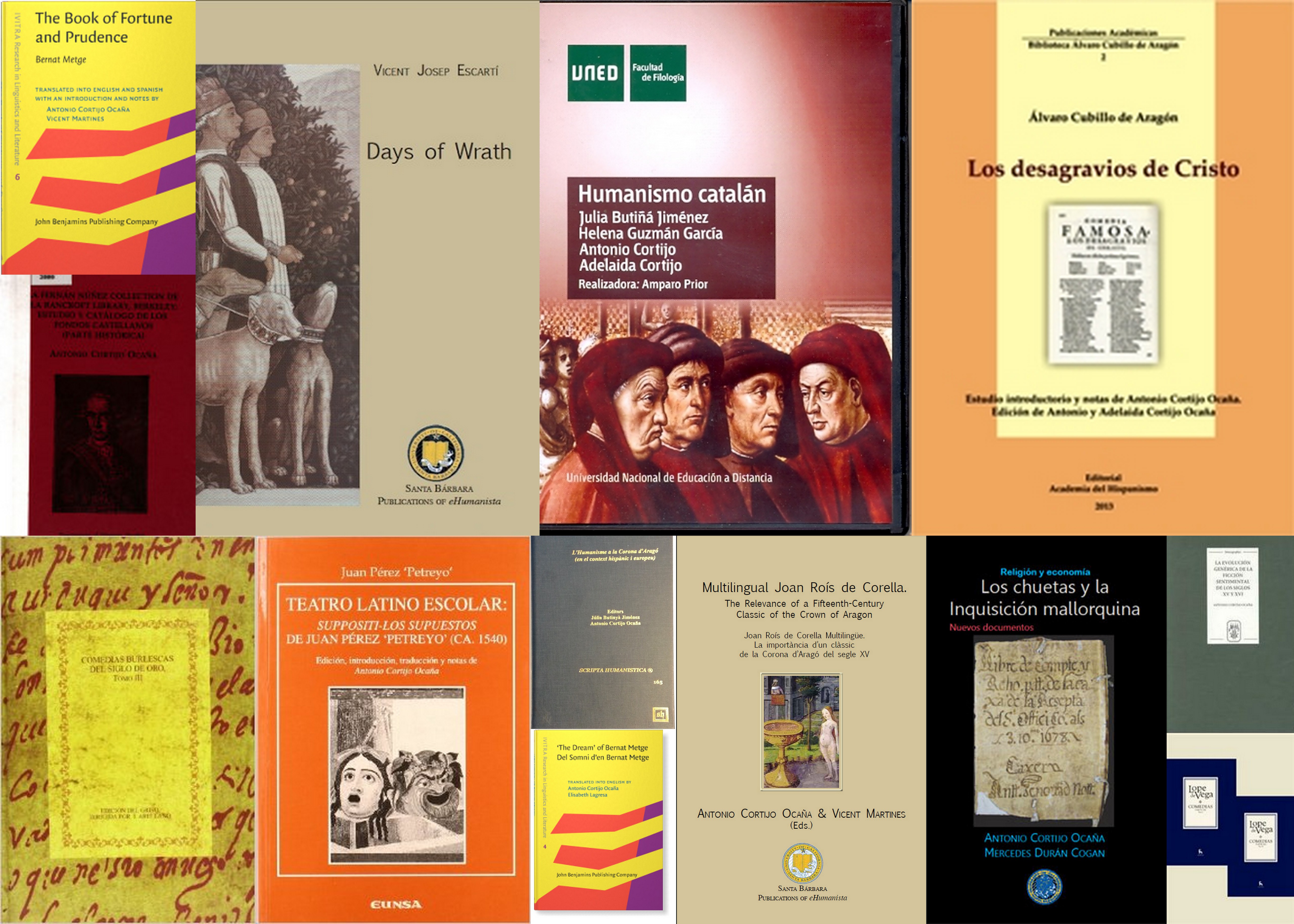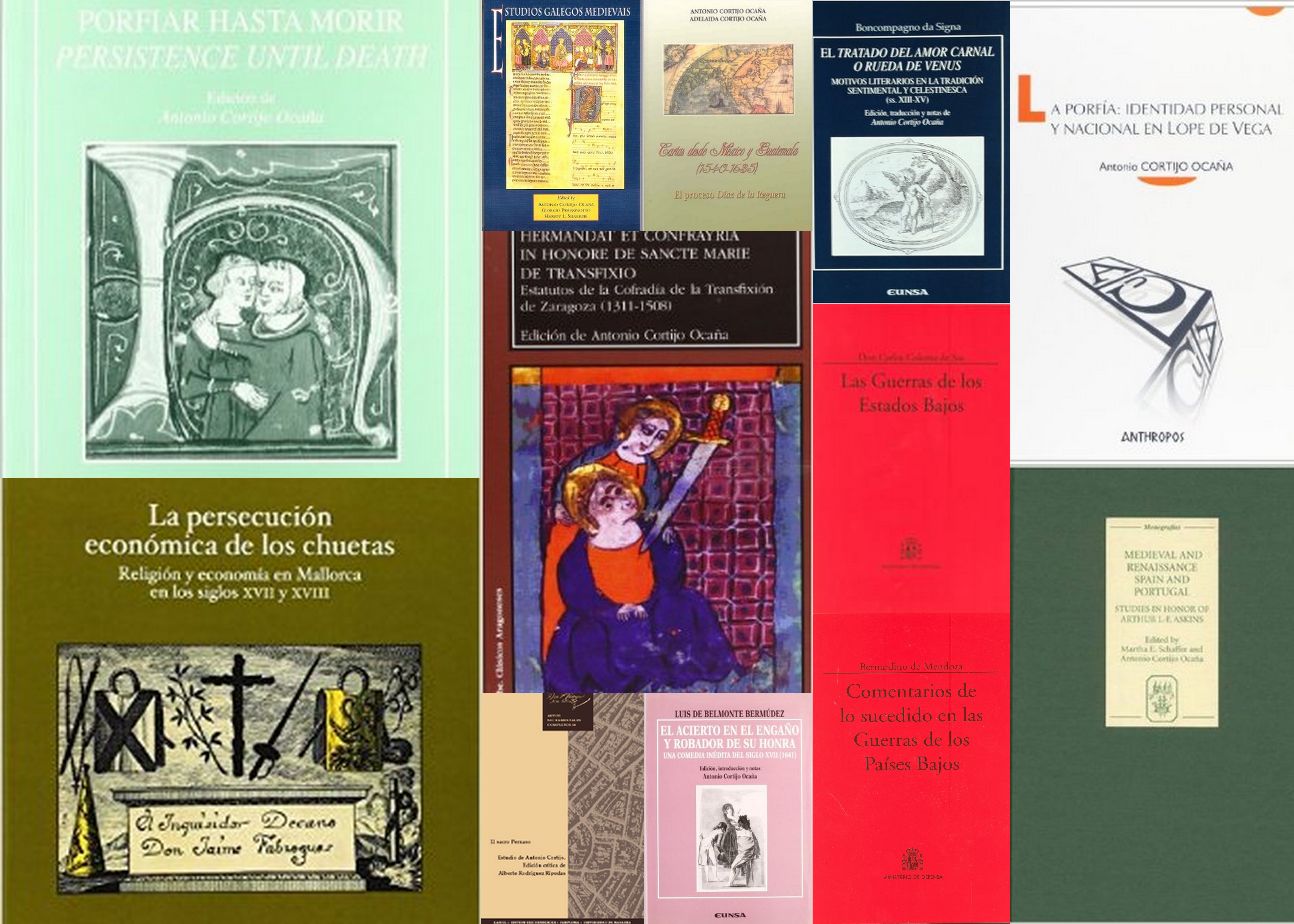
Office Location:
Specialization:
Medieval and Early Modern Spanish, Catalan, and Portuguese Literatures, Golden Age Drama, Latin and Greek Humanism, Medieval and Early Modern History
Bio:
(Ph.D. University of California, Berkeley 1997)
Antonio Cortijo Ocaña analyzes in his research the ideological structures and tensions that have forged the Modern Period across the Atlantic and across the languages and cultures of the Iberian Peninsula. He deals with issues such as nation building, power and ideology, religion and economy in the late medieval through 18th centuries, as well as with the larger topic of the relevance of Humanism in the creation of the modern nations.
He is the autor of La evolución genérica de la ficción sentimental (London: Támesis, 2001) and Pobreza y caridad a fines de la Edad Media y comienzos del Renacimiento (Zaragoza: UP, 2004). He has worked extensively on rhetorical theory, including Teoría de la historia y teoría política en el siglo XVI (Alcalá de Henares: UP, 2000), Boncompagno da Signa. Motivos literarios en la tradición sentimental y celestinesca (ss. XIII-XVI) (Pamplona: Eunsa, 2002), and Boncompagno da Signa. La rueda del amor. Los males de la vejez y la senectud. La amistad (Madrid: Gredos, 2005).
He is the author of Glosa las Trezientas de Juan de Mena (Madrid: Polifemo, 2015) (with Julian Weiss), Sor Juana Inés de la Cruz o la búsqueda de identidad(Sevilla: Renacimiento, 2015). Ramon Llull. Book of the Order of Chivalry (Amsterdam: John Benkamins, 2015), and Ramon Llull. Liber de homine (Madrid: Atenea, 2016).
He has produced three monographs on war, history and ideology in the Early Modern period dealing with the wars of religion of the 16th-17th centuries: Bernardino de Mendoza (Madrid: Ministerio de Defensa, 2008) and Carlos Coloma de Saa (Madrid: Ministerio de Defensa, 2010), as well as a study on nation building and self-identity in Lope de Vega: La porfía: identidad nacional y personal en Lope de Vega (Barcelona: Anthropos, 2013). He has written two books on the intersection of religion and economy regarding theInquisition and the Majorcan Jews (Religión y economía. Los Chuetas y la Inquisición de Mallorca, México: Publications of eHumanista, 2012; Majorca: Lleonard Muntaner, 2013). He has worked on Colonial American history in his Cartas desde México y Guatemala (1540-1635). El proceso Díaz de la Reguera (Berkeley, Cáceres: The Bancroft Library, Universidad de Extremadura, 2003).
He has worked extensively on Renaissance drama, with editions and studies on Calderón de la Barca’s El Sacro Pernaso (Kaseel: Reichenberger, 2006), Lope de Vega’s Porfiar hasta morir (Pamplona: Eunsa, 2004), Belmonte Bermúdez’s El acierto en el engaño (Pamplona: Eunsa, 1998), Pierre de Provenza’s Durandarte y Belerma (Madrid: Iberoamericana, 2002), Pérez Petreyo’s Latin comedy Los Supuestos (ca. 1540) (Pamplona: Eunsa, 2000), and A. Cubillo de Aragón’s Los desagravios de Cristo (Vigo: Academia del Hispanismo, 2013).
As part of his work on digital media and technology and electronic databases and electronic editions of medieval Spanish manuscripts, he is the co-author of ADMYTE (Madrid: Micronet, 1992. CD-Rom), BETA (Berkeley: Bancroft Library, 1998, berkeley.EDU/ PhiloBiblon), PhiloBiblon (BETA) (Berkeley: The Bancroft Library, University of California, Berkeley, 1999, CD-Rom), and ADMYTE (Madrid: Micronet, 1999, CD-Rom). He has also worked extensively on the cataloguing of Spanish archives, with works such as La Fernán Núñez Collection de la Bancroft Library, Berkeley (London: Queen Mary and Westfield College, 2000).
He has co-edited essays on medieval, Renaissance, and contemporary Spanish literature, such as Estudios galegos medievais (Santa Barbara: UCSB, Studia Hispanica Californiana, 2000), From Stateless Nations to Postnational Spain (Boulder, Colorado: Society of Spanish and Spanish-American Studies, 2002), and Medieval and Renaissance Spain and Portugal (London: Tamesis, 2006).
Finally, he is the founder and editor (1999) of the on-line journal eHumanista (www.ehumanista.ucsb.edu) (which includes editions of Gower’s Confessio Amantis [ca. 1400] and H. Núñez’s Comentario a las ‘Trescientas’ [1499]), of eHumanista/IVITRA (devoted to the culture and literature of the Crown of Aragon) and of eHumanista/Cervantes.
His work has been recognized with awards from the National Endowment for the Humanities (NEH), the American Philosophical Society, the Del Amo Foundation, the Calouste-Gulbenkian Foundation, etc. He is a corresponding member of the Royal Academy of Good Letters (Barcelona). In 2000 he received the Diputación de Sevilla Award (Spain) for his Teoría de la historia y teoría política en el siglo XVI. In 2017 he received the Instituto Angelicum Awar (Brazil) for his Herejía, Inquisición y leyenda negra en el siglo XVII. In 2018 he received the Francesco Saverio Nitti (Italy) award for his study and translation of Llull´s Vita coaetanea.
Research:


